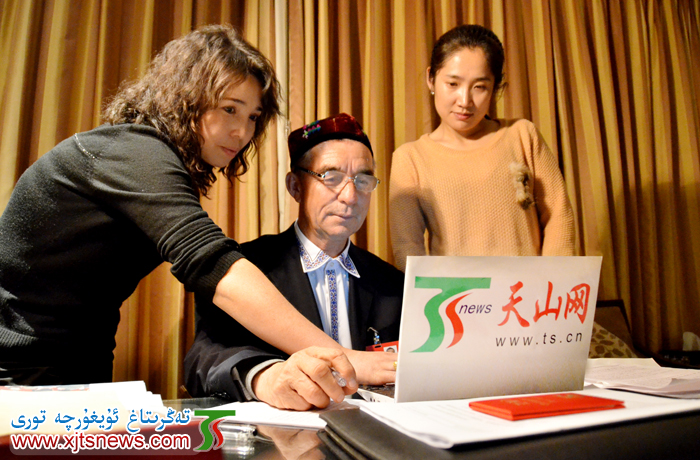Xinhua Uyghur’s Limited Coverage of Leadership Change

November 20, 2012
Greg Fay, Manager, Uyghur Human Rights Project
Xi Jinping, the newly selected General Secretary of China’s Communist Party, held his inaugural press conference last week. His speech, promptly translated on Xinhua’s English site, references China’s obligations to ethnic minority citizens repeatedly. Yet Xinhua’s Uyghur service did not provide a translation of the speech. The service’s coverage of the leadership change included little more than a roster of the 205 new members of the Central Committee, with no mention of Xinjiang Party Secretary Zhang Chunxian’s election to the Standing Committee, and oddly, every minority’s ethnicity listed except for the single Uyghur, Xinjiang Chairman Nur Bekri.
China’s government maintains tight control over access to information for Uyghur people in East Turkestan. After unrest broke out in regional capital Urumqi in 2009, China swiftly shut down the Internet throughout the region, as well as international phone calls, for almost a year. 85% of Uyghur websites were shut down according to an October 2009 Reporters Without Borders survey. One year after the conflict, UHRP issued a report which documents the detainment and imprisonment of Uyghur webmasters, bloggers and journalists, many of whom are believed to remain in prison today.
For many, Xinhua’s Uyghur service is an unwelcome addition to the diminished Uyghur language web-sphere emerging after the 2009 crackdown. Radio Free Asia reported that overseas groups accuse Xinhua of attempting to “brainwash” Uyghurs with the service. Even if Uyghurs do not believe the site’s propaganda, it still serves to whitewash the government’s sustained campaign against the official use of the Uyghur language and its harsh restrictions on Uyghur language websites.
As coverage of the leadership transition demonstrates, Xinhua’s Uyghur service is half-hearted at best. When it was launched two months ago, the government lauded it as a breakthrough for providing authoritative, precise and timely information to Uyghurs. In fact, the site consists of only some original pieces and translations, and mostly links to China’s more robust government-controlled Uyghur news services, China National Radio and regional site TianShanNet. While these sites are no replacement for the independent Uyghur voices online silenced after 2009, Xinhua has failed to even provide Uyghurs with translations of official rhetoric, like statements directed at ethnic minorities in Xi Jinping’s speech.
An information-starved climate is critical for China’s discriminatory ethnic policies to function. As South China Morning Post reported last week, Kurex Kanjir, a Uyghur delegate to the national Congress, stated from the sidelines of the official event that China has “never said people cannot wear traditional ethnic dress.” In fact, curtailment of beards for men and veils for women at hospitals and some private businesses was part of a government crackdown on Uyghurs during Ramadan this summer, as UHRP reported, only the latest in a series of similar policies that have been in place for years.
China has many ways of controlling information. Uighurbiz is a Uyghur website which was closed with so many others in 2009 and restored earlier this year, hosted on foreign servers and currently only in Chinese. Since returning, Uighurbiz’s reporting has been a target of government propaganda. This August, RFA reported that Uighurbiz founder Ilham Tohti, who lives in Beijing, was given a warning after the site posted an article about China’s Ramadan crackdown. Meanwhile, the Chinese propaganda machine churned out its own response to the Uighurbiz report, which dismissed its Ramadan firedrills as a necessary safety precaution.
Though Tohti was detained for two months for Uighurbiz’s reporting in 2009, he fared better than moderate Uyghur journalist, Gheyret Niyaz, a Uighurbiz editor. After the unrest, Niyaz gave an interview to Hong Kong-based Asia Weekly, which earned him a 15-year jail sentence. Niyaz’s sentence was particularly harsh given his pro-Chinese stance. A Communist Party member, one of his last blog posts, “An Analysis of Feeble-Minded Political Statements by Rebiya Kadeer,” firmly established his position that overseas human rights organizations deceive the world about China’s fundamentally good conditions. Whether Niyaz truly believed those words then, it is difficult to conceive he could do so now after his own rights have been so grossly violated.
In his speech, Xi promised, “We will rally and lead the whole Party and the people of all ethnic groups in China in making continued efforts to free up our minds…” In order to do so, the government must relax its crackdown on independent Uyghur voices, free journalists like Niyaz and webmasters imprisoned after 2009, and improve services in the Uyghur language so that Mandarin is not the only option for those who wish to stay informed.
